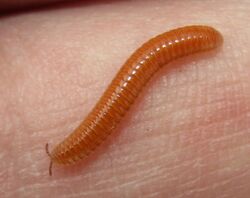Biology:Polyzonium germanicum
| Polyzonium germanicum | |
|---|---|

| |
| Scientific classification | |
| Domain: | Eukaryota |
| Kingdom: | Animalia |
| Phylum: | Arthropoda |
| Subphylum: | Myriapoda |
| Class: | Diplopoda |
| Order: | Polyzoniida |
| Family: | Polyzoniidae |
| Genus: | Polyzonium |
| Species: | P. germanicum
|
| Binomial name | |
| Polyzonium germanicum Brandt, 1837
| |
| Synonyms | |
|
List
| |
Polyzonium germanicum, also known as the Kentish pinhead[1] is a species of millipede within the genus Polyzonium and family Polyzoniidae.
Description
Polyzonium germanicum is a distinctive looking arthropod with a very small triangular shaped head.[1] P. germanicum can range from 5mm to 18mm in length.[1] Unlike most millipedes this species hatches with 4 pairs of legs, opposed to the usual 3 pairs that most other millipede species hatch with.[2] P. germanicum possesses a brownish orange body.[1] P. germanicum possess ozadenes, however they are not present in the first 5 body segments of the organism.[3] These ozadenes will secrete an irritant monoterpene substance to discourage predators.[3]
Distribution
Polyzonium germanicum has an extensive range throughout Europe, where it inhabits both Temperate and Mediterranean climates. The species has been recorded within the countries of: Albania, Austria, Belarus, Bosnia and Herzegovina, Bulgaria, Croatia, Czech Republic, Denmark, Estonia, Finland, France, Germany, Hungary, Italy, Latvia, Lithuania, Moldova, Montenegro, North Macedonia, Poland, Romania, Russia, Serbia, Slovakia, Slovenia, Spain, Sweden, United Kingdom and Ukraine.[4][5]
Habitat
Polyzonium germanicum is a species associated with woodland habitats where it has been recorded to live in mixed deciduous and coniferous woodlands on chalk soils.[1] The species has also been known to live in areas of mature coppices of Castanea sativa and Corylus avellana.[1] Populations are highest in woodland and forest habitats containing coarse woody debris.[6]
In Slovakia P. germanicum has been recorded living in beech forests at 700–1100 meters above sea level.[6]
Subspecies
- Polyzonium germanicum atlanticum (Brölemann 1935) - Located in France.[5]
References
- ↑ 1.0 1.1 1.2 1.3 1.4 1.5 "Polyzonium germanicum Brandt, 1837". 2022-08-20. https://www.bmig.org.uk/species/polyzonium-germanicum.
- ↑ Blower, J. Gordon (1985). Millipedes - Keys and Notes for the Identification of the Species (Issue 35 ed.). Linnean Society of London and the Estuarine and Brackish-Water Sciences Association. pp. 65. ISBN 9789004076983.
- ↑ 3.0 3.1 Natural History Book Reviews (Volume 8 ed.). A B Academic Publishers. 1985. pp. 179.
- ↑ "Occurrences". 2023-01-22. https://www.gbif.org/occurrence/search?taxon_key=1026477.
- ↑ 5.0 5.1 "Polyzonium germanicum atlanticum Brölemann, 1935". 2023-01-21. https://www.millibase.org/aphia.php?p=taxdetails&id=953973.
- ↑ 6.0 6.1 Topp, Kappes, Kulfan, Zach, Werner, Heike, Jan, Peter (2005-05-11). "Distribution pattern of woodlice (Isopoda) and millipedes (Diplopoda) in four primeval forests of the Western Carpathians (Central Slovakia)". Soil Biology and Biochemistry 38: 43–50. doi:10.1016/j.soilbio.2005.04.012. https://www.sciencedirect.com/science/article/abs/pii/S0038071705001665. Retrieved 2022-08-20.
Wikidata ☰ Q6450578 entry
 |

